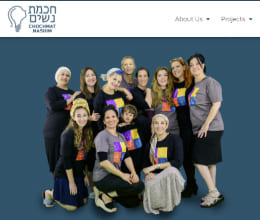In Israel, a man rides a bike down a busy street. Instead of passing the slow moving bus before him, he trails closely behind it. As the bus stops at a red light, the biker reaches out, tearing at the advertisement posted at the back of the bus. In full view of pedestrians, bikers and drivers, he rips at the poster until it falls to the street. Satisfied, he rides off.
In another Israeli city, two men walking with children and strollers stop beside a parked bus. As the children look on, the men exert great effort to pull down the advertisement plastered to the side of the bus. Intent on their work and ignoring the children behind them, they don’t stop until the poster is destroyed, the advertisement no longer recognizable.
We know of both of these incidents because they were filmed in broad daylight. Both of the defiled advertisements had women’s smiling faces. The vandals were ultra-orthodox men.
It has become the norm in cities across Israel for advertisements and posters of women to be defaced — literally. Whether spray-painted over or torn down, ads with women — even girls — are vandalized on a regular basis.
It is against Jewish law to destroy another’s property. It is not against Jewish law to post or see modest images of women.
It is true, and perhaps even praiseworthy, that the Charedi community insulates its members from outside influences. Seperate schools, separate communities, separate media. They work hard to ensure that their values and way of life is protected.
But what happens when the rules they enact for themselves are taken beyond their community and imposed upon others? And what happens when a value of modesty is taken to such extremes that its worship damages not only property but actual women as well?
Noa Choritz, director of Terem, an emergency clinic in Jerusalem, says that she regularly sees a direct correlation between erasing images of women and the consequences it has on their health. “Women are dying from illnesses that could be prevented or treated, simply because we are oversexualizing things that should not be sexualized.”
She is referring mainly to breast cancer, which is not uttered or pronounced in any ultra-orthodox media or pamphlets – but also other diseases, the signs and symptoms of which many Charedi women are not aware.
Self checks and screenings are not discussed in ultra-orthodox schools and they are not discussed in ultra-orthodox media. She sees women who are already in the advanced stages of breast cancer who believe they have a skin irritation or a nursing related infection.
Fay Sukenik, an ultra-orthodox activist for women in divorce, says that the culture of silence and erasure of women affects them to the extent that at times when they must stand up for their and their children’s rights and needs, such as in divorce proceedings, they simply can’t speak out.
This, she says, leads to a loss of the rights that they have coming to them according to both secular and Jewish law. Her organization, Basher Tilchi, helps women learn to self-advocate in court.
Thousands of Jewish women have been speaking out against their erasure. They ask that this policy, which began in the most insular of communities but has now spread to become the norm in orthodox publications, be re-evaluated.
One advocate, who asked not to be named, says, “Seeing the Jewish family depicted without a mother or daughters is shocking. My daughter asks what is the point of modesty if I’m never modest enough to be seen? What do I tell her?”
A few rabbis — but not enough — have begun to speak out. Rabbi Yitzchok Adlerstein of Los Angeles and Jerusalem says, “For decades I had to defend Judaism from skeptics who would say, how are you different from the Taliban? With confidence I could point to halacha that specifies limits and boundaries. I think excluding women as a matter of public policy, admittedly not halacha, is a body blow to halacha itself.”
The erasure of images of Jewish women, the ban on discussing their health and wellness and the intense and increased segregation we find today are distortions of Judaism that have deadly real world consequences.
Originally published in The Jewish Chronicle


